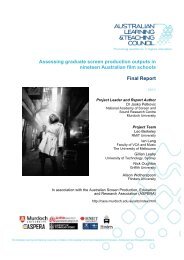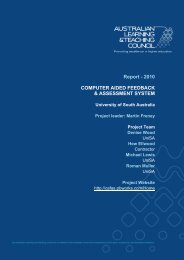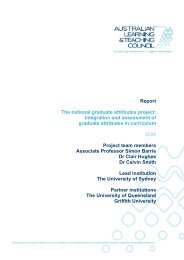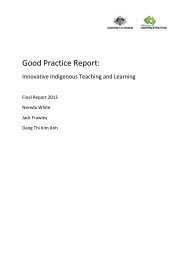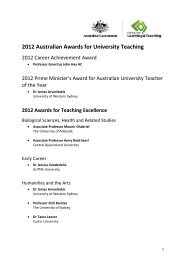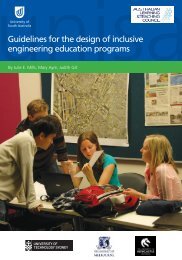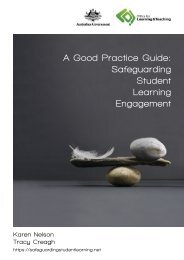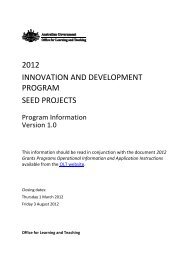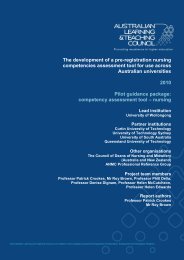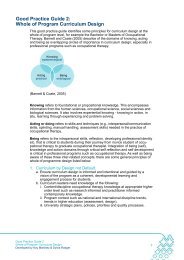Download Document - Office for Learning and Teaching
Download Document - Office for Learning and Teaching
Download Document - Office for Learning and Teaching
You also want an ePaper? Increase the reach of your titles
YUMPU automatically turns print PDFs into web optimized ePapers that Google loves.
<strong>for</strong> studying in Australian universities. You need be able to use English skillfully inyour study.Prepare to adopt new study methods/strategiesA student-centred teaching <strong>and</strong> learning approach is very common in Australianuniversities. In this approach, students play an important role in the teachingprocess. They interact with the lecturer/tutor in the classroom by frequentlychallenging the lecturer/tutor, asking questions <strong>and</strong> responding to lecturer’squestions, <strong>and</strong> so on. Class discussion is another aspect of the student-centredteaching <strong>and</strong> learning method. Teacher-student (<strong>and</strong>/or student-student) interactionsrequire good communication skills <strong>and</strong> excellent English listening <strong>and</strong> speakingabilities. An inactive student (e.g., who never asks questions, never responds to thelecturer’s question, or keeps silent in class is thought to have a negative approach tothe teaching session because he/she failed to make a contribution. By contrast, theteacher-centred approach requires little or no input or response from students. Asianstudents, especially those from Confucian-heritage cultural backgrounds, are usedto the teacher-centred approach, <strong>and</strong> have no wish to challenge the lecturer/expert<strong>and</strong> express critical thinking. These students must try to adopt the new challenge ofthe student-centred teaching <strong>and</strong> learning approach in Australian universities.Minimum English requirementsGenerally, passing an English test (such as IELTS) does not mean that your Englishis good enough to deal with all learning situations/challenges in Australianuniversities. The following should be treated as minimum English requirements: yourEnglish should enable you to listen to lectures effectively, to respond to lecturer’squestions in the classroom, to actively participate in class discussion, to writeassignments <strong>and</strong> technical reports, to read texts at a reasonable speed, <strong>and</strong> so on.In other words, your English should be at a level that enables you to cope withclassroom communication in all four macro-skills of listening, speaking, reading, <strong>and</strong>writing. Use a checklist on English proficiency to gain a better underst<strong>and</strong>ing of yourweaknesses in English language. If any of the above four macro-skills is belowminimum requirement, you should devise a study plan to combat such weaknesses.Set small achievable goalsLanguage <strong>and</strong> cultural adjustment cannot happen overnight; it takes time <strong>and</strong> lots ofpractice. By setting smaller, achievable goals, one can see the improvement overtime. For example, one such a goal could be “by week five I shall be able tounderst<strong>and</strong> 60% of what the news reader says”.Create the learning environmentThe best way to learn a culture (<strong>and</strong> its language) is to live with the locals. Stayingwith an Australian host family will provide you (or <strong>for</strong>ce you) to learn the Australianway of life. While many students don’t like the idea mainly due to the awkwardnessat the beginning, they benefit from this lifestyle quickly <strong>and</strong> extensively. Survey datahas shown that living with locals can dramatically improve international students’listening <strong>and</strong> speaking skills in a very short time period. For example, students couldcommunicate easily with their Australian host family (or local housemates) afterliving with them <strong>for</strong> just one year or less.Make an ef<strong>for</strong>t to make new friends, particularly of the local students. Our studyshows that many local students are unwilling to work in groups with internationalstudents while many international students can see the benefits of working with localstudents. This means that international students need to make a greater ef<strong>for</strong>t tofoster such partnerships.Join study groups, study buddyStudents should recognise the importance of “collaboration” in learning <strong>and</strong> shouldjoin a study group or find a study buddy from the very beginning of their university139



